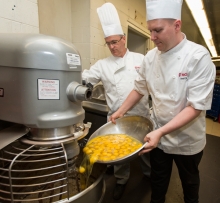
Feeding a University
The Gazette | Sept. 7, 2014
by: Lesley Chesterman
Gone are the days when thousands of McGill students had to subsist on doughnuts and sad steam trays; over the last five years, the university has transformed its food services, and tapped into the wealth of produce grown at its Macdonald Campus.

Which Mode of Travel Provides the Happiest Commute?
The Atlantic: CityLab.com | Aug 20, 2014
Written by: Eric Jaffe

What’s in McGill’s giant brownie?
McGill Reporter | Aug 21, 2014
By: Neale McDevitt
The gigantic brownie will be the main attraction at the annual McGill à la carte event to be held in the tent on the downtown lower campus on Tuesday, Aug. 26, during which thousands of students, faculty, staff and hungry Montrealers will be invited to sample the delicious dessert.

Future Earth coming to Montreal
McGill Reporter | Aug 11, 2014
By: Chris Chipello
Montreal will soon become one of five global hubs for Future Earth, a 10-year international research program stemming from the 2012 United Nations Conference on Sustainable Development in Rio de Janeiro.

Global Warming: Planet Hits Natural Pause Button
International Business Times | July 22, 2014
By: Jayalakshmi K

Hungry for something healthy and new? Why not make dinner with crickets tonight!
McGill Student Jakub Dzamba desigs cricket incubator to feed growing interest in insect farmingPublished on July 23, 2014 | Journal Metro
by: Mathais Marchal

Can Urban Agriculture Feed the World's Growing Cities?
Living in a city puts everything at your fingertips: From fashion and movies to social movements and political experiments, residents of urban areas experience most everything before it trickles through the suburbs and into rural communities.Published on July 29, 2014 | Yahoo! News
by: Willy Blackmore

City-grown vegetables could feed urban dwellers
In a number of cities around the world, residents have transformed previously derelict sites, ignored corners and over-grown verges into green and productive vegetable plotsPublished on July 30, 2014 | Environmental Research Web

McGill University Student Uses Pulse Energy API to Create the McGill Energy Map
To encourage more active commuting among McGill staffPublished on July 14, 2014 | Pulse Energy News
by: Meena Mohan

Showers available for bike commuters
To encourage more active commuting among McGill staffPublished on June 15, 2014 | McGill Reporter
by: McGill Reporter

McGill Fossil Fuel Decisions Shift
The McGill University board of governors has included “grave environmental degradation” as allowable criteria for divestment.Published on June 10, 2014 | The Gazette
by: Karen Seidman
Many students at McGill University are celebrating a fundamental shift in how the university will decide whether to stop investing in fossil fuel companies.

McGill Students Fiona Yuan and Christopher Tegho win at 2014 Scotiabank EcoLiving Student Leadership Award
Yuan and Tegho are in their last year of electrical engineering at McGill University and are keen about sustainability and energy conservation. Together they designed an “energy management and power disaggregation” system that helps homeowners and businesses better monitor, control and manage the energy use of individual appliances.

Podcast: Environment or Economy: At the Muskoka Summit
Published on June 4, 2014 | CBC
Ideas with Paul Kennedy

Given our frigid climes, think indoor greenery
Montreal — Green spaces can help obliterate blue spaces in our minds: It’s a no-brainer.Published on May 30, 2014 | The Gazette
by: Bill Brownstein

Harvesting water out of thin air
Harnessing humidity to quench thirst in the world’s most arid regionsPublished on May 13, 2014 | McGill Reporter
by: Neale McDevitt and Chris Chipello

